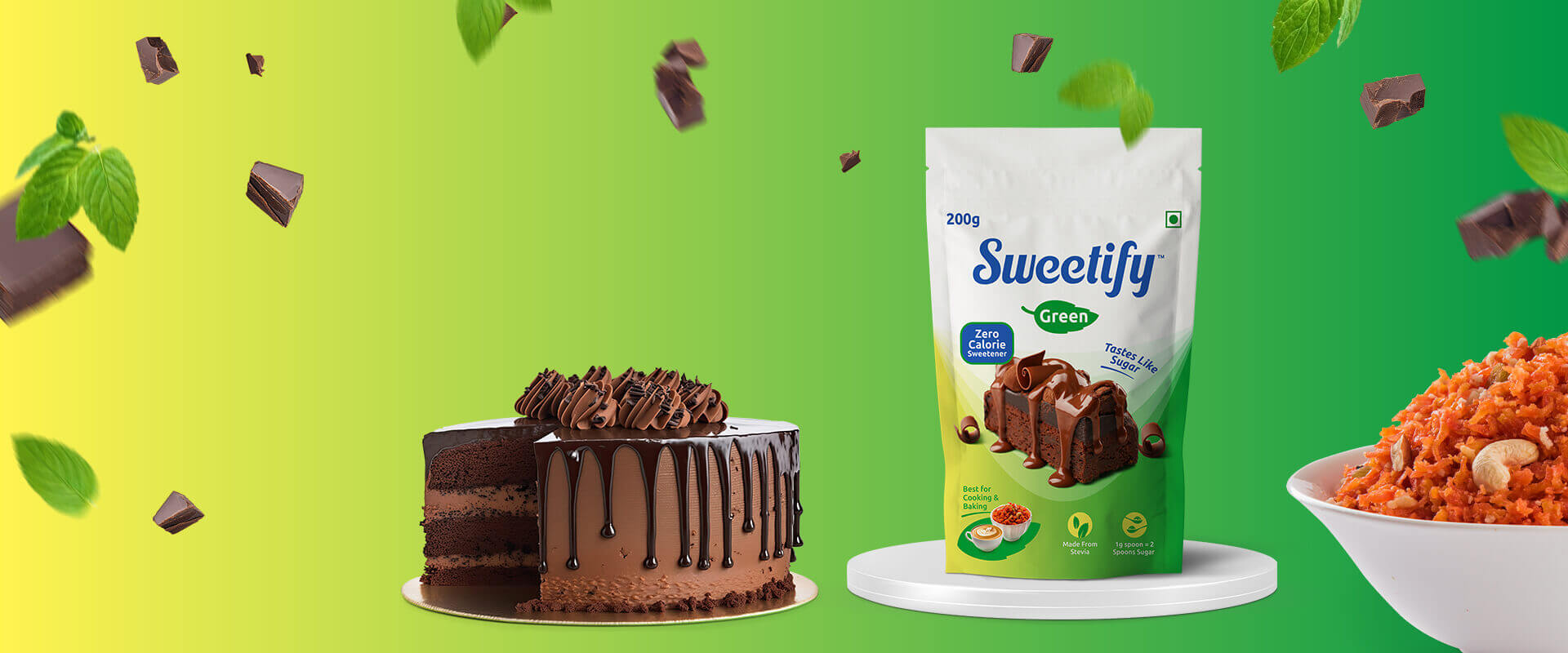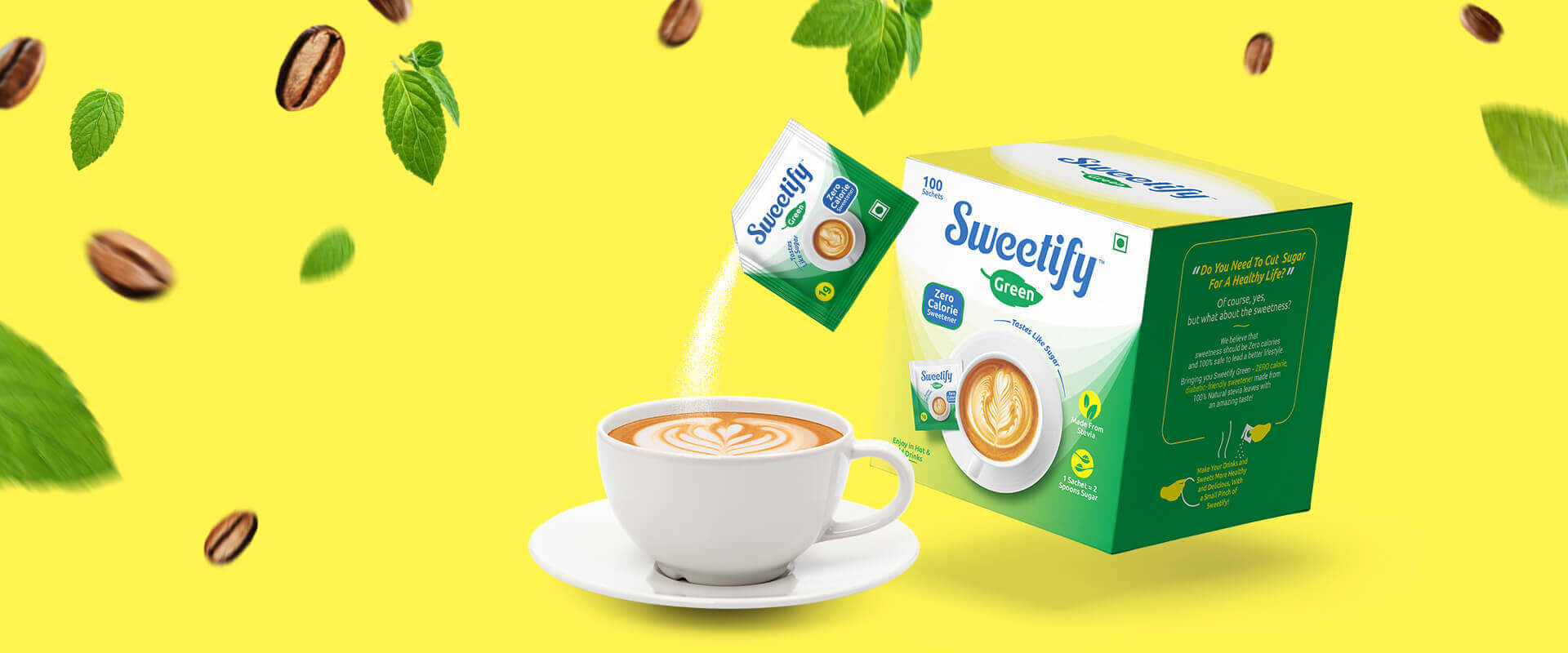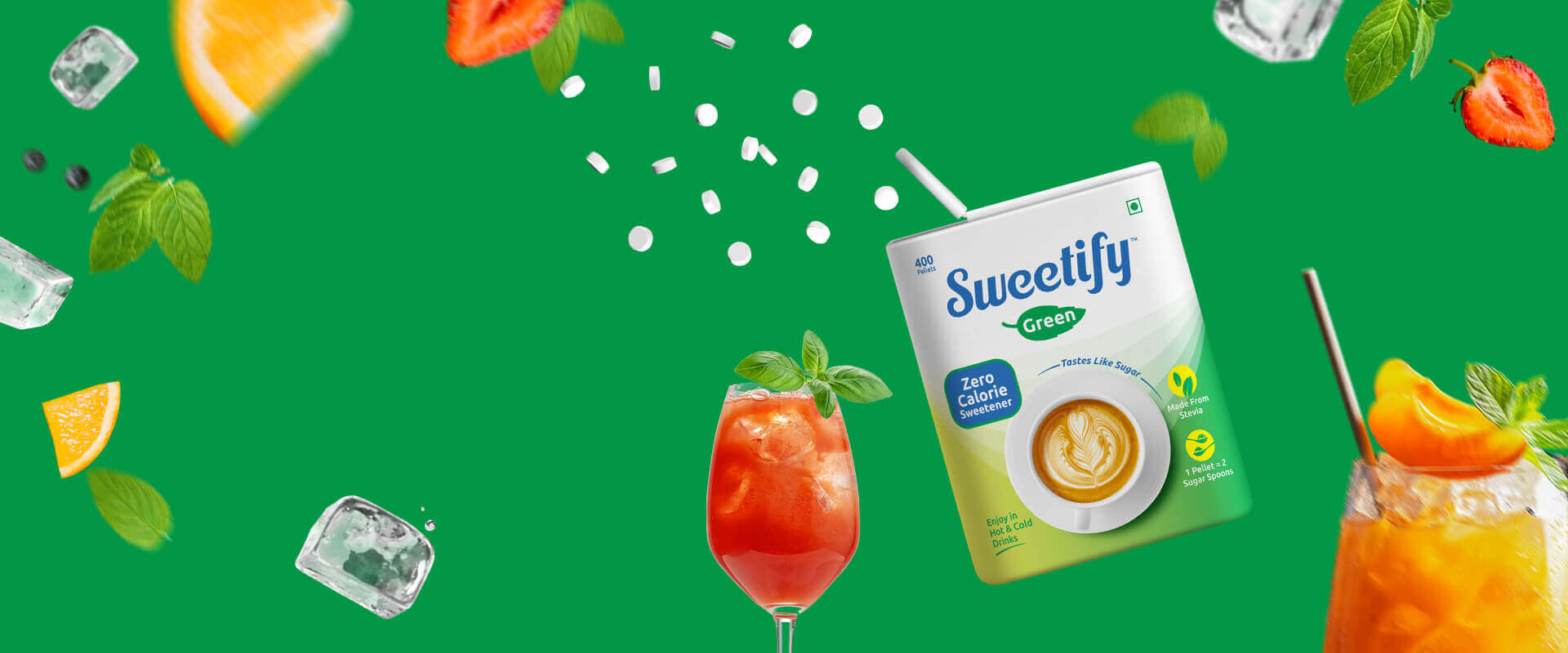Here again to find something informative? Here are 10 points for you, sweetie pie: Get 10% FLAT OFF on Sweetify orders with code - BLOG10.
So, starting with our next post, we will go into detail about the types of artificial sweeteners, and natural food sweeteners so it becomes easier for you to pick a side 🙂
What Are Artificial Sweeteners?
Artificial sweeteners are synthesized sugar substitutes made to give a sugar-like sweet taste that can be added to a variety of foods and drinks. These are usually low or zero calories, are diabetic-friendly, and do not hamper blood sugar levels. Most of the market-available types of artificial sweeteners are:
- Sucralose
- Aspartame
- Saccharine
- Xylitol
Based on this artificial sweeteners list, we can look at their pros and cons for everyday consumption.
Cons of artificial sweeteners
Though artificial sweeteners have now become easily available for usage, it is wise to consider all the pros and cons. Let’s understand the cons first.
- May Spike Insulin: Not all artificial sweeteners will be good for us. Some of these are known to increase/spike insulin levels on everyday intake, which may be a case of crucial importance for diabetic people.
- Health Effects: Being derived from various sources such as aspartame, sucralose, and saccharine, these sweeteners have been linked to one or the other long-term effects on the body. In the very recent reports by WHO, aspartame has been declared to be potentially carcinogenic - which means it may have cancer-causing elements. Moreover, artificial sweeteners may affect the gut health. Having artificial sweeteners in our diet should be a very careful choice after reading the ingredients on the label because certain sugar alcohols are hidden under confusing chemical names.
- Aftertaste: being highly processed, artificial sweeteners may leave an aftertaste when consumed in food or drinks.
This aftertaste ruins the experience of having something sweet.

Pros of Artificial sweeteners
While we have seen the cons, it is time to look at the pros of artificial sweeteners, and how we can use them.
- Easy to use: Artificial sweeteners are very easily available in the market and are easy to use as well. Their versatility in the form of powder, liquid, and pellet is suitable for all kinds of Indian desserts and beverages. The only catch here is that the quantity needs to be carefully adjusted as these sweeteners are 2-7x sweeter than sugar.
- Low calorie: For the ones looking to cut their calorie intake, switching from sugar to sweeteners can be a good idea. Some of the artificial sweeteners will have 0-calories while the rest may be called ‘low-calorie’
What are natural sweeteners?
Now that we have read a bit about artificial sweeteners, it is time we explore nature’s sweetness that is offered to us without any processing, chemicals, or preservatives(natural food sweeteners).
Natural sweeteners list:
- Honey
- Brown sugar
- Dates and date sugar
- Jaggery
- Stevia
Honey:
Honey has been used in Indian households as a sugar replacement for a long time now, and its familiarity with usage is wide. Honey can be used in a lot of desserts and smoothies however, it is going to give its distinct aroma and taste that feels a bit strong for everyday consumption. Honey may not be suitable for tea, coffee, or other beverages as a natural sweetener.
Does honey spike insulin? YES.
Is honey 0-calorie? NO.
Brown Sugar:
Brown sugar is derived from sugarcane or sugarbeet plant. It contains molasses which increases its nutritional value a bit compared to white sugar. It can be used easily in desserts, bakery items, and drinks. Brown sugar contains slightly higher amounts of calcium, iron, and potassium. However, it is pretty close regarding the calorie difference from sugar.
Does brown sugar spike insulin? YES.
Is brown sugar 0-calorie? NO.
Dates and Date Sugar:
dates are yet another naturally sweetening fruit that can be used in many food varieties to replace processed sugar. Dates having high antioxidants and fibre, can be great options for cutting sugar. Dates and date sugar have a low glycemic index, which means they are less likely to spike your insulin, but not completely out of the scope.
Does date sugar spike insulin? YES
Is date sugar 0-calorie? NO.
Jaggery:
Jaggery or Gud is already one of the most commonly used sweeteners in Indian households. Our moms have been giving us gud as a tiny treat or gud candies after meals. It tastes almost like sugar and is derived from palm trees or sugarcane. There are lots of health benefits of gud(jaggery) as per ayurveda and science. It is less processed than sugar, but we need to note that it has almost the same level of calories as sugar, and can spike insulin.
Does jaggery spike insulin? YES
Is jaggery 0-calorie? NO.
Stevia:
Stevia is commonly known as meethi tulsi in India. It has been taken as a sugar substitute for a long time now. The stevia leaves, naturally demonstrate a bitter aftertaste and leafy texture when taken raw with drinks or food. Having such a strong sweet intensity of being 200-400 times sweeter than sugar, it is used in very minimal amounts.
Though stevia can be used as it is in raw form, many people prefer the slightly purified version of stevia sweeteners that do not give any aftertaste, and feel just like sugar. The best part of stevia is that it is 0-calorie, does not spike insulin, is diabetic-friendly, and is perfect for weight management! The stevia sweeteners seamlessly blend with your tea, coffee, and all desserts!
Does stevia spike insulin? NO.
Is Stevia 0-calorie? YES.
Conclusion
In conclusion, these sweeteners may better fit you if you prefer chemical-less or natural sugar alternatives. However, it has to be noted that these do spike insulin and should be taken in moderation.
If you have diabetes, then it is advised to take a doctor's suggestion before using any natural or artificial sweeteners daily.
FAQs
-
What are artificial sweeteners?
Artificial sweeteners are derived from non-natural or sugar-alcohol compounds like maltodextrin, aspartame, Neotame, Saccharin, etc. - What are the cons of using artificial sweeteners?
Artificial sweeteners are being used by the majority of people worldwide, however, the FDA has repeatedly published reports on the cons of some of these sweeteners. The cons may include insulin spikes, addiction, or the compound being potentially carcinogenic to the body. - How do natural sweeteners differ from artificial sweeteners?
Natural sweeteners are derived from natural sugar sources such as honey, brown sugar, coconut sugar, jaggery, etc. At the same time, artificial sweeteners contain maltodextrin, aspartame, Neotame, Saccharin, etc. Both have their pros and cons. -
Are there any health risks associated with artificial sweeteners?
As per reports, aspartame - found in the majority of artificial sweeteners may potentially carry carcinogenic (cancer-causing cells).





